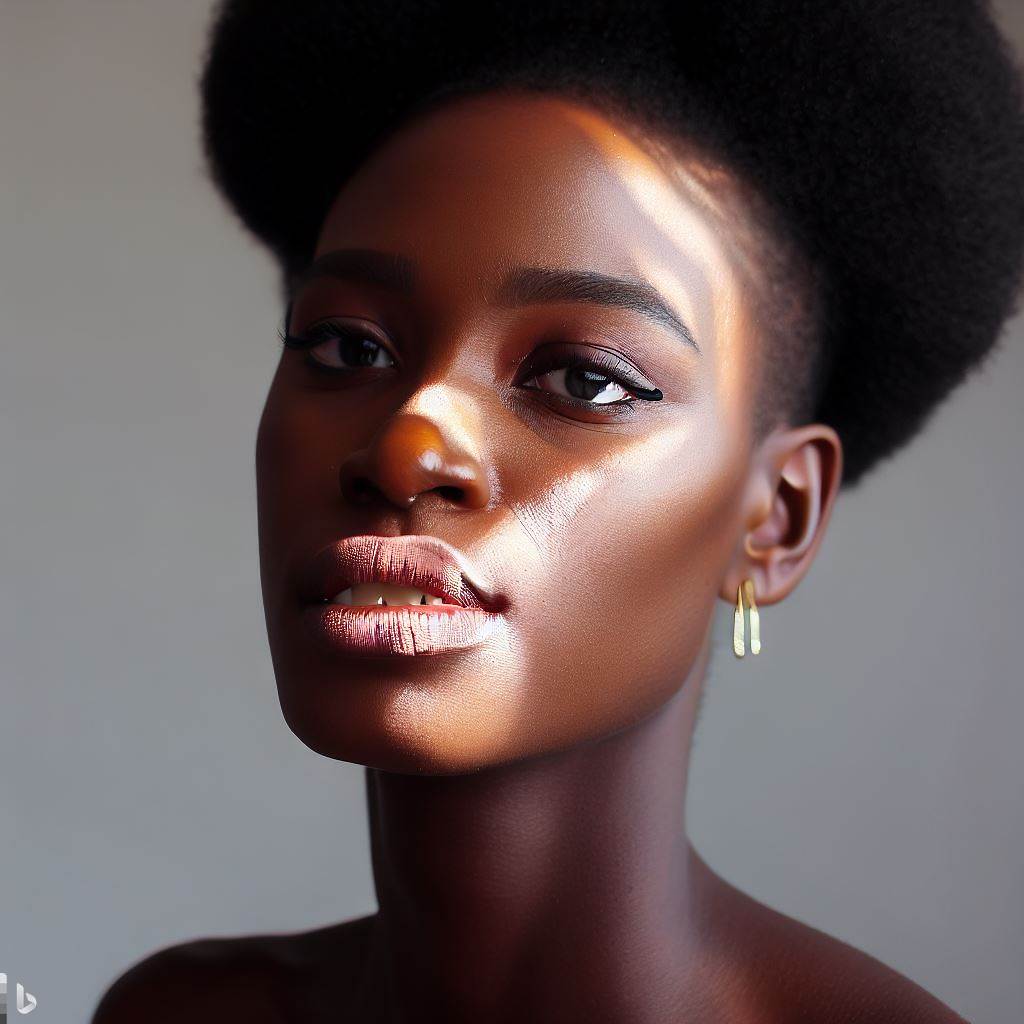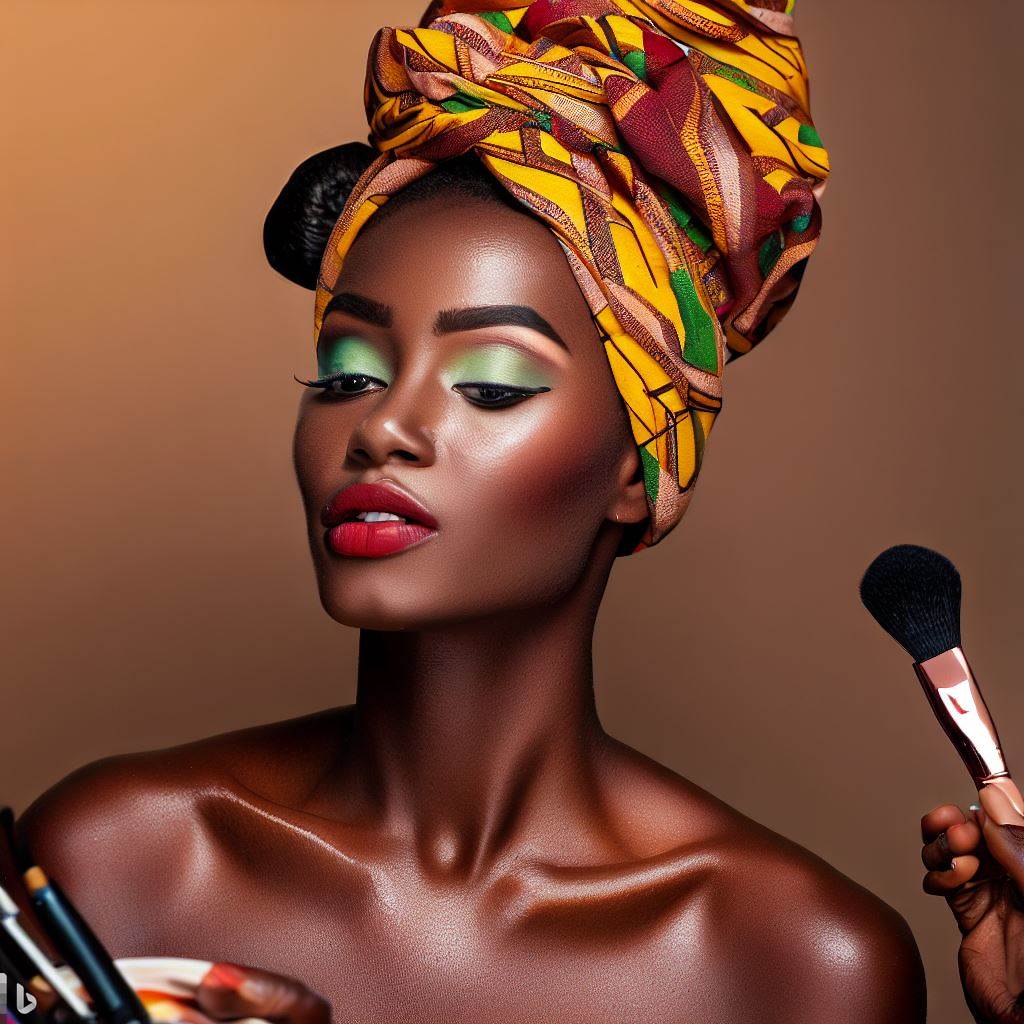Introduction
Makeup artistry has become increasingly popular in Nigeria, with a growing number of talented artists emerging in the industry.
As the demand for makeup services rises, it is crucial to establish regulations and ethical standards to ensure the safety and professionalism of makeup artists.
This blog post explores the need for regulation and ethics for makeup artists in Nigeria, highlighting the benefits and challenges in implementing such measures.
Understanding the Makeup Artistry Industry in Nigeria
Overview of the makeup artistry industry in Nigeria
- The makeup artistry industry in Nigeria is a flourishing and vibrant sector.
- It encompasses a wide range of makeup services, from bridal to special effects.
- Makeup artists in Nigeria offer professional services to clients for various occasions.
- The industry is highly competitive, with numerous talented artists vying for recognition.
- There is a growing demand for makeup services due to the increasing popularity of the beauty industry.
Growth and popularity of makeup artistry in recent years
- The makeup artistry industry in Nigeria has experienced significant growth in recent years.
- This growth can be attributed to the rise of social media platforms and beauty influencers.
- Many aspiring makeup artists have gained recognition through their online presence.
- The popularity of Nigerian celebrities and their flawless makeup looks has also fueled the growth.
- Makeup artistry has become a viable career choice for many young Nigerians.
Challenges and issues faced by makeup artists in Nigeria
- Despite the growth and popularity, makeup artists in Nigeria still face several challenges.
- Limited access to quality makeup products is a major issue faced by many artists.
- High import duties on cosmetics make it difficult to obtain affordable and authentic products.
- The lack of regulation and licensing requirements within the industry is another challenge.
- Many untrained individuals offer makeup services, leading to subpar results and potential risks for clients.
- Makeup artists also struggle with fair compensation and lack of respect for their profession.
- Networking and building a client base can be challenging, especially for new artists.
- There is a need for more professional training and skill development opportunities.
- Ethical issues, such as maintaining client confidentiality and adhering to hygiene standards, must be addressed.
- Collaboration and support among makeup artists can help overcome these challenges and create a thriving industry.
- Efforts are being made to regulate the industry and establish professional standards.
- Professional associations are emerging to provide support, training, and advocacy for makeup artists.
- The government needs to implement policies that promote the growth and sustainability of the industry.
- Clients also play a crucial role by demanding services from certified and reputable makeup artists.
In the end, the makeup artistry industry in Nigeria has seen remarkable growth in recent years. However, it still faces challenges such as limited access to quality products, lack of regulation, and fair compensation.
Efforts are being made to address these issues and create a thriving and ethical industry.
Collaboration, professional training, and government support are essential for the continued success of makeup artists in Nigeria.
Read: Ethics and Professionalism for Artists’ Agents in Nigeria
The Regulatory Framework for Makeup Artists in Nigeria
As it stands, Nigeria does not have any specific regulations in place for makeup artists. There are no governing bodies or regulatory agencies that oversee the industry.
Implications of the absence of regulations
- Lack of industry standards – Without regulations, there are no set standards for the practice of makeup artistry.
- Risk to public health – The absence of regulations increases the risk of unhygienic practices and potential health hazards for clients.
- Lack of consumer protection – Clients have no means of seeking recourse if they are dissatisfied with the services provided by a makeup artist.
Comparison with regulatory frameworks in other countries
- United States – The makeup industry in the US is regulated at both the federal and state levels. Artists are required to obtain licenses and adhere to health and safety regulations.
- United Kingdom – In the UK, makeup artists may need to obtain public liability insurance and certifications in order to practice professionally.
- Australia – Australia has a comprehensive regulatory framework for makeup artists, including licensing requirements and strict health and safety regulations.
- South Africa – Regulations in South Africa require makeup artists to register with the relevant authorities and comply with health and safety standards.
Overall, the lack of specific regulations for makeup artists in Nigeria puts both professionals and clients at a disadvantage.
It is crucial for the government to develop a regulatory framework that ensures the safety of clients and promotes professionalism within the industry.
Read: Daily Life of a Nigerian Sound Effects Editor
Benefits of Regulation in the Makeup Artistry Industry
A well-regulated makeup artistry industry in Nigeria brings numerous benefits that contribute to the growth and development of the profession.
Not only does it ensure quality and safety standards, but it also enhances professionalism and credibility while protecting the consumers.
Ensuring quality and safety standards
Regulation plays a crucial role in maintaining the quality and safety standards within the makeup artistry industry.
By implementing regulations, the government and relevant authorities can enforce specific requirements that practitioners must meet to ensure the highest level of quality in their work.
These standards may include proper hygiene practices, the use of safe and non-toxic products, and adherence to professional techniques.
Through regular inspections and licensing procedures, regulators can verify that makeup artists comply with these standards, reinforcing the trust of consumers.
By doing so, the public can have confidence in the expertise and skills of makeup artists, which contributes to greater customer satisfaction.
Professionalism and credibility
Regulation adds a layer of professionalism and credibility to the makeup artistry industry.
When makeup artists are required to meet specific educational and training criteria, it establishes a higher level of competence within the profession.
This not only ensures that practitioners possess the necessary skills but also instills a sense of professionalism among them.
Furthermore, regulation often involves the creation of professional associations or bodies that govern the industry.
These associations can set ethical guidelines and codes of conduct, ensuring that makeup artists uphold certain ethical values in their work.
This fosters trust and confidence among clients, knowing that they are receiving services from certified and ethical professionals.
Consumer protection
One of the significant advantages of regulation in the makeup artistry industry is the enhanced level of consumer protection.
By establishing guidelines and procedures for makeup artists to follow, regulators safeguard consumers from potential harm or subpar services.
Regulation ensures that makeup artists work in a safe environment and use products that meet health and safety standards, mitigating the risk of allergic reactions and other adverse effects.
Additionally, licensing requirements can help eliminate unqualified individuals from practicing, protecting the public from untrained or inexperienced makeup artists.
In the event of a dispute or dissatisfaction with services, regulation allows consumers to seek recourse and file complaints against makeup artists who breach ethical or professional standards.
This promotes accountability and encourages practitioners to maintain a high standard of practice. In fact, the benefits of regulation in the makeup artistry industry in Nigeria are manifold.
From ensuring quality and safety standards to enhancing professionalism, credibility, and consumer protection, regulation plays a vital role in shaping and advancing the industry.
By adhering to regulations, makeup artists can deliver their services with confidence, while consumers can trust in the competence and ethics of the professionals they engage.
Read: Challenges and Triumphs in Nigerian Journalism

Ethical Considerations for Makeup Artists in Nigeria
Importance of ethical behavior in the profession
As a makeup artist in Nigeria, adhering to ethical behavior is crucial for maintaining a reputable and trustworthy profession.
Ethical behavior ensures that clients feel safe, respected, and satisfied with the services provided.
Key ethical considerations for makeup artists
Client confidentiality
Respecting client confidentiality is a fundamental ethical consideration for makeup artists in Nigeria. Clients trust makeup artists with their personal image, and it is the artist’s responsibility to uphold this trust.
Makeup artists should never share any client information, such as names, addresses, or images, without explicit consent.
Respecting their privacy is crucial for maintaining a professional and trustworthy relationship with clients.
Informed consent
Obtaining informed consent from clients before providing any makeup services is another essential ethical consideration.
Makeup artists should explain the procedures, products, and potential risks involved in a clear and understandable manner.
Clients should have the opportunity to ask questions, express concerns, and make informed decisions regarding their desired makeup look.
The consent should be documented to ensure transparency and accountability.
Hygiene and sanitation practices
Hygiene and sanitation practices are vital in the makeup industry to prevent the spread of infections and maintain the health of clients.
Makeup artists should prioritize cleanliness and strict hygiene standards in their work. This includes regular sanitization of brushes, tools, and surfaces.
Disposable applicators should be used whenever possible to avoid cross-contamination. Proper hand hygiene, such as washing hands and using hand sanitizers, should also be practiced.
Non-discrimination and inclusivity
Makeup artists in Nigeria should embrace non-discrimination and inclusivity.
Every client should be treated with respect and fairness, regardless of their background, race, ethnicity, religion, gender, or any other characteristic.
Artists should create a safe and inclusive environment where clients feel valued and comfortable expressing their individuality.
Discrimination or bias in any form should never be tolerated, and makeup artists should actively promote inclusivity in their practices.
By considering these ethical aspects, makeup artists in Nigeria can build a strong professional reputation and contribute to the overall growth and development of the industry.
Read: Nigeria’s Journalism Landscape: Past, Present, Future
Challenges and Obstacles to Regulation and Ethical Practice
Lack of awareness and education about regulations
- Many makeup artists in Nigeria are not fully aware of the existing regulations.
- The lack of education about regulations leads to non-compliance and unethical practices.
- Without proper knowledge, makeup artists may unknowingly violate regulations, risking their clients’ health and safety.
- Awareness campaigns and educational programs should be implemented to address this issue.
Resistance from unregulated makeup artists
- Unregulated makeup artists may resist efforts towards regulation, fearing additional requirements and costs.
- They may argue that regulation limits their creative freedom and hampers their ability to meet client demands.
- This resistance poses a significant obstacle to achieving industry-wide regulation and ethical practice.
- Engaging with these makeup artists, addressing their concerns, and highlighting the benefits of regulation can help overcome resistance.
Lack of enforcement mechanisms
- The absence of proper enforcement mechanisms undermines the effectiveness of regulations.
- Without enforcement, makeup artists may continue to operate illegally or engage in unethical practices without consequences.
- Authorities should establish strong enforcement agencies and mechanisms to ensure compliance and hold violators accountable.
- Regular inspections, penalties for non-compliance, and a complaint mechanism should be put in place.
In review, addressing the challenges and obstacles to regulation and ethical practice in the makeup industry in Nigeria is crucial for ensuring the safety and well-being of both makeup artists and their clients.
It requires raising awareness and providing education about existing regulations, addressing resistance from unregulated artists, and establishing robust enforcement mechanisms to ensure compliance.
By overcoming these obstacles, Nigeria can create a thriving makeup industry with ethical standards that protect the interests of all stakeholders.
Discover More: The Role of PR in Nigeria’s Corporate World
Recommendations for Regulation and Ethics in the Makeup Artistry Industry
The makeup artistry industry in Nigeria is rapidly growing, with an increasing number of individuals pursuing careers as makeup artists.
However, as the industry expands, there is a need for proper regulation and ethics to protect consumers and maintain professional standards.
In this section, we will explore a few key recommendations to address these concerns.
Establishing a regulatory body or association
One of the most significant steps towards effective regulation and ethics in the makeup artistry industry is the establishment of a regulatory body or association.
This body would be responsible for overseeing the industry, setting standards, and enforcing regulations.
It would ensure that makeup artists meet certain requirements and adhere to ethical principles while providing services to clients.
By establishing a regulatory body or association, the industry can self-govern and maintain a level of professionalism.
This governing body can provide guidelines on educational qualifications, training requirements, and business practices.
It can also enforce ethical conduct, addressing issues such as client confidentiality and fair pricing. Having such an association would promote trust and confidence in the makeup artistry industry.
Developing industry-wide standards and guidelines
In addition to a regulatory body or association, the development of industry-wide standards and guidelines is crucial.
These standards should cover various aspects of makeup artistry, including hygiene practices, sanitation procedures, product safety, and professional behavior.
Clear and comprehensive standards would ensure that makeup artists are equipped with the necessary knowledge and skills to provide quality services.
It would also protect consumers from unprofessional and unethical practices. These standards should be regularly updated to keep up with technological advancements and industry trends.
Collaboration between makeup artists, policymakers, and stakeholders
To ensure effective regulation and ethics in the makeup artistry industry, collaboration between makeup artists, policymakers, and stakeholders is vital.
Regular dialogue and engagement with relevant parties would help develop and implement appropriate regulations and guidelines.
Policymakers should consult and involve makeup artists and industry experts when formulating regulations and policies.
This would ensure that the perspectives of those directly involved in the industry are considered.
Makeup artists should actively participate in discussions and provide feedback to help shape regulations that are practical and beneficial for all parties involved.
Collaboration with stakeholders, such as consumer advocacy groups and beauty product manufacturers, can also contribute to the development of industry-wide standards and guidelines.
These stakeholders can provide valuable insights and expertise for crafting effective regulations and ensuring consumer protection.
Basically, proper regulation and ethics are vital for the makeup artistry industry in Nigeria.
By establishing a regulatory body or association, developing industry-wide standards and guidelines, and fostering collaboration between makeup artists, policymakers, and stakeholders, the industry can thrive while maintaining professionalism and protecting consumers.
These recommendations will contribute to the growth and success of the makeup artistry industry in Nigeria.
Conclusion
Regulation and ethics play a crucial role in the makeup industry in Nigeria. They ensure the safety and well-being of clients, establish professionalism, and maintain the integrity of the industry.
It is imperative for the makeup industry and relevant authorities to actively implement and enforce regulations and ethical guidelines. This will protect consumers and create a level playing field for all makeup artists.
The future of the makeup industry in Nigeria holds great potential. With proper regulation and ethical practices, it can thrive and compete on a global scale.
Continuous training and education will ensure that makeup artists stay updated with industry trends and safety practices.
Additionally, advancements in technology and the use of organic and cruelty-free products are expected to shape the future development of the field.
The journey towards a regulated and ethically sound makeup industry in Nigeria requires the collective efforts of makeup artists, industry associations, and relevant authorities.
Collaboration and adherence to regulations and ethical standards will foster growth and build trust among clients.
Let us strive for professionalism and excellence as makeup artists, for the betterment of the industry and for the satisfaction of our clients.




